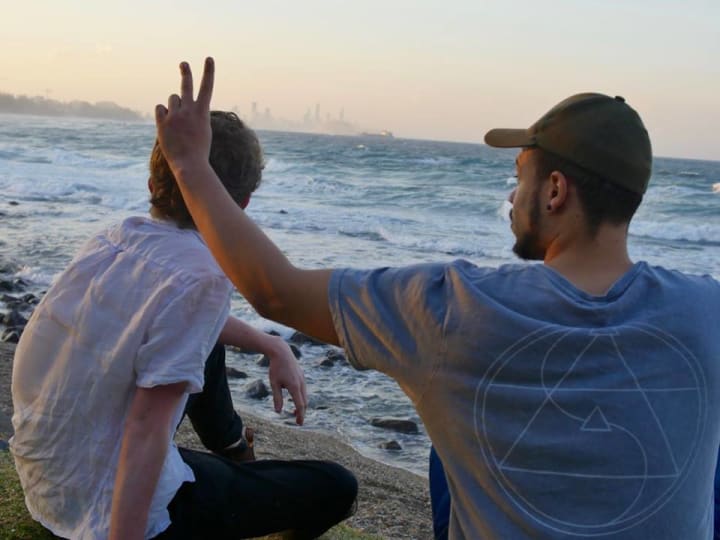Do You Really Need Money to Travel?
Your fears about lack of money may be holding you back.

Ahh, the dreaded M-word.
Money is the biggest barrier to travel. Like most ‘yeah but’s, there is a large portion of truth in it. Yes, you do indeed need money to travel... mostly.
It is possible to get by bumming around, hitching trains, grabbing snacks off refugees etc. but it is not recommended. You probably will need money. However, this is nowhere near as big a problem as people think it is. In fact, as an excuse not to travel it is poor.
If you think traveling is expensive, you should see how expensive not traveling is: accommodation costs represent a greater portion of our paycheck than ever before, our groceries are becoming more expensive, and education fees get higher and higher. You can spend an equal or greater amount of money sitting where you are doing something you don’t want to do.
It’s amazing how much people spend to build an environment around where they reside to make themselves comfortable when they can spend a percentage of that going to the place that they feel comfortable in.
The money objection so often rests on a misunderstanding of what going traveling means. You should not think of traveling the same way you think of visiting another country for a holiday. It would indeed be stupid to spend your money as if you were on holiday for many months.
You don’t have to treat it like a holiday, you can change your whole life situation. Instead of doing a crappy job in a place you hate, you can do a crappy job in a place you love. Instead of drowning in Jager bombs at the weekend, you go surfing. Instead of hanging around the same people you’ve known since primary school, you meet new exciting people every day.
Assuming you have a job and accommodation, all traveling requires is a change of job and a change of accommodation, plus transport costs. You’re not actually, on NET, spending more money.
Stop thinking in terms of "leisure time" and "serious time" and think about what kind of lifestyle you want to live and how you’re going to get there. More and more people are even building their career in such a way that allows them to have a variety of place. If you really want to travel, get creative and think about how you want to make money.

The Genius of Separate Savings Accounts
Having said that, some money is needed for initial transport costs and to tide you over until you get a job. If you are literally broke and spending what you earn, here is what you do:
Open five savings accounts. You can do this with multiple banks or just one. Lloyds Bank allows you to make essentially unlimited savings accounts for £1 each.
They offer a paltry 0.25% interest, mind you, but earning interest is not why you’re creating the accounts.
You create these accounts to have a better idea of how much money you have, regain control over your finances, and most importantly feel good about your money. Most of us harbor nagging anxiety about our money, if we’re lucky enough not to be constantly worrying about whether our pay will be enough to cover the bills, we’re worried we’re not saving enough for the things we want to do. This method of money management relieves you of that anxiety and helps you be much more positive.
The idea is that with each pay-check, after you have paid for all your bills and mundane living expenses such as food, laundry, fuel, etc., you split the remainder, no matter how small, into these savings accounts. The fraction of that remainder you put into each is up to you, but it’s important you split them.
You name one: Long-Term Savings. This is for any large purchase you are waiting to buy in the future, whether it be a new laptop or a deposit on a flat. This is the kind of money you’re not usually able to produce with a click but will need in the future. Dedicating one saving account for such things first lowers the temptation to spend the money, and helps you see how far you still have left to go. If it’s a nice purchase, it’s a nice incentive.
Since you want to go traveling, you may as well use this one for your flight tickets, as this is likely to be the most expensive thing you will need.
The next is Financial Freedom. This is your rainy-day account for the future, for emergencies and when things go wrong. If you find yourself having to go home, having that bit of cash to tide you over is a life-saver. It’s also helpful if you lose or break an important, expensive possession. If you want, you can use this account to save for retirement, if you are thinking that far. The important thing to remember is that this is not to be touched unless you are in one of the above scenarios.
Then you have Personal Development. This is for the money you are planning on investing in yourself to potentially increase your income and/or value in the future. You can use this one to pay for any course fees that will help your career, or in language lessons.
Next, you have Giving. This is money that you will spend on someone else, whether that comes in the form of presents for friends and family, or your charity fund.
Finally, the most fun one: Guilt-Free Play. With this account, you must in no circumstance ever use the money for anything important. This is strictly for wasting your money for no reason on things to enjoy. This is your going-out fund, the account you withdraw from when you want a new video game or the hot pair of shoes that you’ll probably only wear once. This is an account to come to when you’ll feel guilty of withdrawing from any of the others.
Now, don’t you feel so much better? All that money only for wasting?
Now to anticipate the criticisms: yes, when you see those hot pair of shoes in the window, you will feel tempted to withdraw from the other accounts. Technically, there is nothing to stop you from doing just that. But what splitting the accounts does is introduce that extra step. To buy those shoes, you can’t, as before, just hand over your bank card to charge directly to your current account (there’s nothing in there). You must first open your Online Banking App, type in your password, and transfer the money from you need from the necessary account. It’s a lengthy process and gives you a chance to think twice about whether you really want to make that purchase. You can also directly see how much money you have in your accounts, and it will remind you of what you’re saving for. It helps you get over the initial “want” feeling that so often undoes us.
“And what if, after I have paid my bills, I have very little or nothing to save?” I hear you thinking (I bet you didn’t know I was clairvoyant, hey?). Well, I believe you have the potential to save much more money by introducing this money management strategy to your life—but still, it is not strictly about how much money you save, but how you feel about money. Say that all you have left over is £5 every week. That is, depending on you want to divide it, £1 a week you’re putting into each account. Every week you’re seeing that account increase. Even though it is small, it is extremely gratifying to see your wealth increase and it makes you want to earn more money.
Besides, this situation is still a whole lot better than pooling all your money in one big lump, with little to no idea of how much money you spend on certain things. In such situations, you end up putting off looking at your bank statements out of guilt. The 5-account savings technique encourages you to look at your accounts all the time, simply because you must be constantly analyzing how much you have left to spend on specific things.
If there is a target you’re waiting for, see if you can do some "Extreme Saving." This is when you put away 70-75 percent of your income into a savings account and don’t touch it. It requires living frugally, but you’ll be delighted at the outcome.
The Money-Saving Mindset
I’m astonished at some of the reactions when people are told to save. They will absolutely insist that they have no money whatsoever for traveling and it’s impossible to convince them otherwise. But this can only be the case if you are spending what you earn immediately. You must be saving for something; otherwise what is the point of putting up with that horrible job?
This may sound difficult, and obviously there will need to be sacrifices or you get another job to pay for the lifestyle you want. However, keep the prize in mind and see what you can do without to make it happen as fast as possible.
Are you serious about changing your life or are you content where you are? Think about that.
Your travel fund will need to cover: the flight(s), visa money, medical costs, new clothes and gear, some extra for the time before you get a job, and some extra in case your visa requires you to show a certain amount of money in your account to prove you’re not coming to their country to be a waster.
Usually, it is cheaper to find rented accommodation than live in a hostel, plus you have more privacy and a place to put your stuff, etc. However, the downside is that you are usually committed to a contract of about 6 months to a year, though with a bit of digging you can find exceptions. If not, you can try Airbnb that occasionally has postings that offer long-term stays.
When it comes to food it is imperative you cook for yourself, preferably sharing with others, as opposed to eating out. It costs about the same to find fresh ingredients in a market and knock up a stew that will last 3 days than have one meal at a fast-food outlet. Things like stews, rice and pasta are easy to cook and not too expensive. Remember to include protein, because as much as backpackers would like to believe, one cannot survive on just 2-minute noodles.
You may need to cut down on leisure expenses, such as going to the cinema and buying fresh clothes every season. I wouldn’t recommend trying to cut down on nights out because you will be around so many backpackers the temptation will be too great. You can try your best though, or you can save money by having a few cheap beers in the hostel some nights rather than buying expensive drinks at a nightclub.
The important thing to remember is that traveling is not about blowing everything you have on a big trip. It is about adjusting your lifestyle from that of a plant to a human being. In other words, tailor your ways to the traveler life.
About the Creator
James Michael Smith
Writer, film-maker from the UK.






Comments
There are no comments for this story
Be the first to respond and start the conversation.